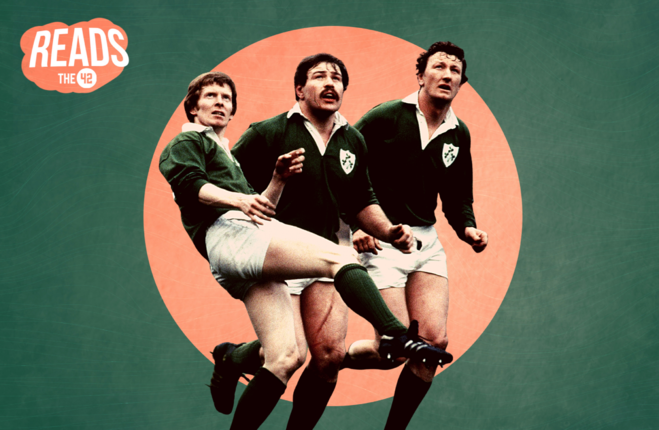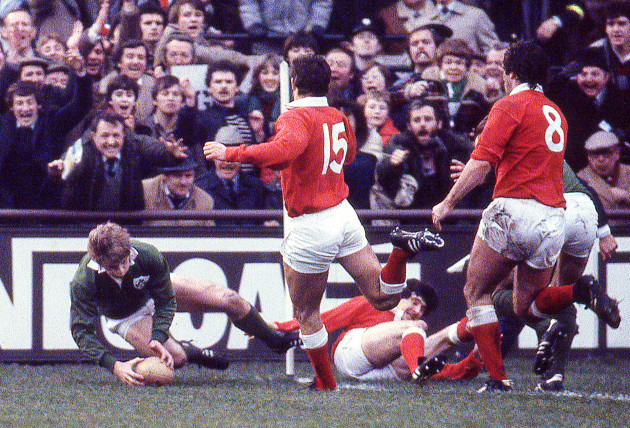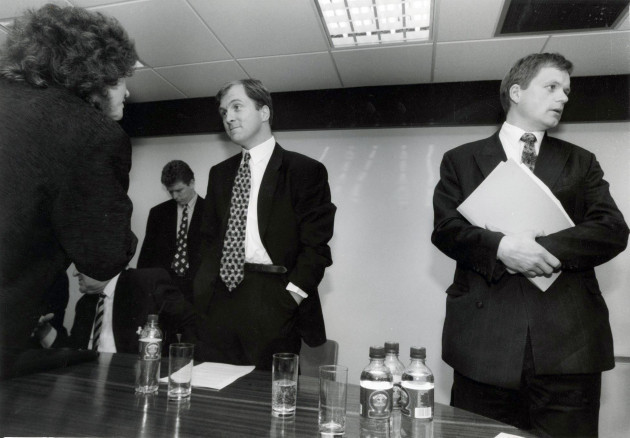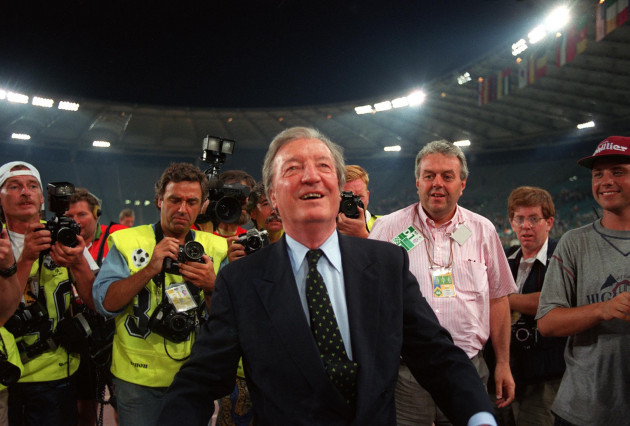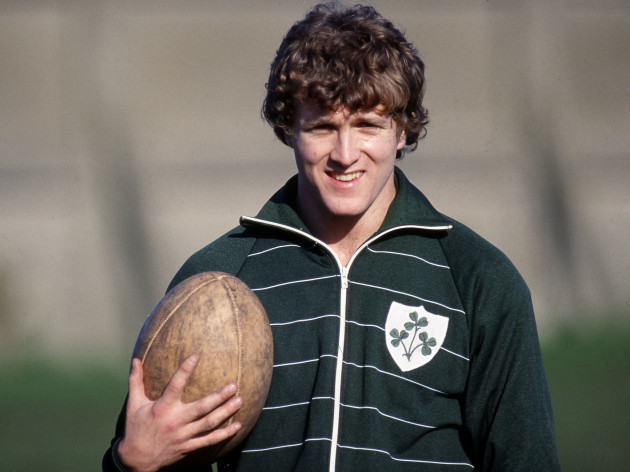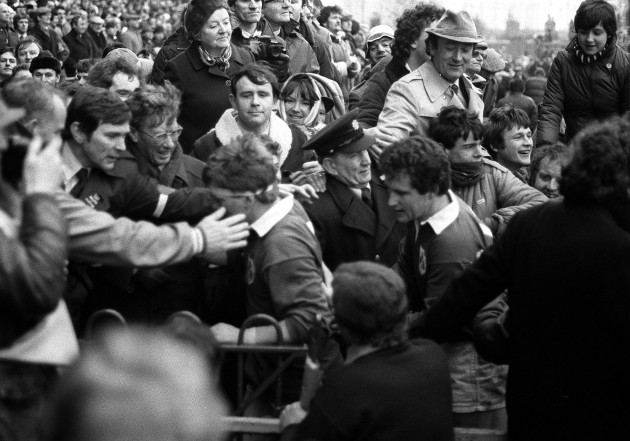OUR STARTING POINT really should be Ginger McLoughlin’s try or Ollie Campbell’s kicks. We should be talking about a bridge between 1949 and 1982 but instead we are drawn to a different one that links north with south, nationalist with unionist, Catholic with Protestant.
The easier thing would be to gloss over all this, to acknowledge its existence but move on. Yet there’s something that draws you back, a conversation from a few months ago, a sentence that sounded so implausible at the time that it took a second phone call to clarify it.
One funny story had led to another. You had jokingly referred to him in print as stout, a point of great amusement to his kids, who teased him the way children do when they reach that stage when parents are seen as friends rather than melts.
Hard as it is to believe, the man who scored vital tries in Ireland’s joyous Triple Crown campaigns in both 1982 and 1985 is 62 now. What’s even harder to comprehend is what happened long ago.
On the same night republicans were firing shots at his father, an RUC man, in north Belfast, security forces were frantically trying to stop loyalists burning out the family home in Larne. And all this while, their famous son never thought twice about loading the gear bag into his car and driving south of the border to represent Ireland. “Why would I?” Trevor Ringland asks. “It was an honour.”
But it was much more than that. What Ringland did in 1982 and 1985 went way beyond rugby.
**
- See sport differently with The42 Membership and get closer to the stories that matter with exclusive analysis, insight and debate. Click here to find out more>
You have to understand Northern Ireland to appreciate why the events of three Saturday afternoons in the spring of 1982 are so important. You have to open your eyes and ears, forget your prejudices and find a way to respect the wildly different views of republican and loyalist, nationalist and unionist.
You have to stop and think about what’s normal to you now. A child in the North today can enter a shop without a security man rumbling through their schoolbag to see if they are carrying explosives. It’s also safe to assume the 21st century Ulster child won’t hear adults speak in hushed tones about all-night vigils to prevent homes or businesses being burned out.
None of that was possible in 1982. Instead you walked the main street of your town past armed soldiers who moved in zigzag patterns to protect themselves from potential snipers. You visited a friend’s house and stared at the black-and-white photo of his father, murdered in cold blood in the name of Irish freedom.
That was what normal life entailed back then. You lived with the trauma of a neighbouring family being massacred in their own home, of another friend going temporarily without a home because it was blown apart by a bomb.
Normal life now doesn’t involve a seven-year-old trying to judge whether the bomb he just heard was 10 miles away or 20 because of the length of time it took for his living room window to stop shaking.
Normal life now is hearing the birds outside your window chirp, a sign that spring is here. Back in 1982, the sound of summer was provided by the engines of British army helicopters flying low overhead as the sun blazed hot and the clouds stayed away.
Normal life now is the safety of knowing that when a younger cousin or sibling emigrates for London or Boston, that they might come back. Normal life then was watching the sunken faces of uncles, aunts, mothers and fathers return home from a ferry port with the expectation their children were gone for good.
Normal life now is expecting Ireland to beat Scotland today and win a sixth Triple Crown in 18 years. When the boys of 1982 had their Triple Crown date against the Scots, they were seeking to become Ireland’s first winners of the prize since 1949.
Is that enough to suggest that triumph was the greatest one of all in Irish rugby? After all, it was Scotland they were beating – not New Zealand. After all, it was only for a Triple Crown, rather than a grand slam, never mind a World Cup.
For some of us, though, it stood for something priceless, showing how it didn’t take a bomb to unite Irishmen; how a sport involving an odd-shaped ball could give so many of our lives a lucky bounce.
The brilliance of that win over Scotland 40 years ago had nothing to do with the quality of the play, for Campbell aside, there wasn’t much of that. No, it was for something much more significant; it was for teaching younger members of our society, and reminding the older ones, that Ireland wasn’t just a place where things went wrong.
It was also a country where cross-border organisations could function successfully. All you needed were people brave enough to give it a go.
**
On Wednesday this week, Hugo MacNeill drove to Belfast, a trip he has made many times.
A boyish enthusiasm follows MacNeill around; the smile on his face apparent when he talks about the old days, how his natural curiosity and interest in politics persuaded him to break the ice and ask about a taboo subject: The Troubles in Northern Ireland.
“Tell me about what’s happening there,” he said to Ringland, his room mate in that 1982 season.
Ringland was only too happy to talk. MacNeill was a person he could trust, and one he had to trust because if he messed up on the wing, then MacNeill, the full-back on that 1982 team, was his cover. Forty years on, they’re still looking out for one another. “When you make a friend with an Ulster person, you make a real friend,” says MacNeill.
It isn’t a throwaway line. MacNeill has a young son who wasn’t too well recently. After a while he began to notice something. Beyond his family circle, no one rang as often to inquire after the child’s health as the Ulster boys he played alongside for Ireland.
Theirs was an easy friendship to build, MacNeill finding it natural to ask about his ancestors’ province – Eoin MacNeill, the founder of the Gaelic League, being a great-uncle of his. “We hadn’t labels on our backs,” he says, “we weren’t talking to one with any political agenda; we were just young fellas interested in each other’s lives.
“I found it incredibly powerful, to be honest. Here I was, a young man on a rugby team, learning about the complexities of the North. For someone like me – my people are from Glenarm in Antrim – I just loved the place from the moment I first went there. I still do. It has always been in my blood.”
He listened to Ringland’s story, the pre-Troubles upbringing on the Falls Road where his father was once stationed, the complexities of feeling British yet being so deeply proud to represent Ireland. “The flag that flies at Lansdowne Road when Ireland play is a different tricolour to the one wrapped around the IRA,” Ringland would say.
Unlike most of that ’82 team, Ringland and MacNeill shared an interest in politics. In time they would enter that sphere; the pair arranging a peace international in 1996, bringing the greatest players in the world to Dublin. “Seeing the power of sport, how it can heal, that was incredible,” says MacNeill.
He relished learning things from different perspectives, how the unionist wasn’t a person to be scared of, how the northern nationalist felt abandoned and persecuted in equal measure, how not everything in life is black or white, especially when you throw in splashes of orange and green.
“It’s crucial for our society to learn about the sensitivities that exist on both sides of the political divide,” says MacNeill.
There was a lot to be educated on back in 1982. The months leading up to Ireland’s Triple Crown were some of the most turbulent of the last 50 years, as the Hunger Strikes brought northern tensions south of the border. While the crisis eased in September ’81, the following year brought a fresh problem, Anglo/Irish relations worsening when Ireland broke from the EEC’s support for Britain during the Falklands War.
The then Taoiseach, Charlie Haughey, was a polarising figure; Irish politics constantly on the verge of collapse, three elections called over an 18-month period.
“There was a sense that civil war had maybe been averted in 1981,” says historian, Dr Brian Hanley, “even though the violence continued after the Hunger Strikes. It was the constant drumbeat in the background of everything that went on.”
And there was so much going on. While Ireland were beating Wales, England and Scotland in that year’s Five Nations championship, Israeli forces were invading Lebanon; a new Cold War chapter was being written; and to top it all off, a deepening economic crisis led to the scourge of emigration returning to Irish life. “By the mid-80s, 40,000 people were leaving each year,” says Hanley.
MacNeill was one of those. “It was a time when confidence was low, when Ireland was a very, very depressed place, where an atmosphere existed where you felt the country was in a difficult position,” he says. “There was not much hope or positivity on any front. Add in the background of the 1981 Hunger Strikes, such a deeply emotive subject, and really it felt like a dangerous time.”
For Ringland, and every Ulster player who represented Ireland back then, danger was a constant companion, members of the Garda special branch subtly appearing at every training session, meal time and impromptu walk from the team hotel to a coffee shop.
Watching all this, MacNeill, a Dubliner, and Michael Kiernan, a fresh-faced 21-year-old from Cork, began to look at the world in a different light. “Certainly it was something I was very conscious of,” says Kiernan, better known for his winning drop goal in the ’85 campaign but a central player in the ’82 season, too. “We may have been from culturally different backgrounds (to the Ulster players) but we became friends from the get-go and remain that way today.”
Seven weeks ago, for the Ireland/Wales match, he and Ringland sat next to each other at the Aviva. Today his neighbour in the stadium will be Philip Mathews, a star on the 1985 side. It was another hero from ’85, Nigel Carr, whose house MacNeill stayed in on Wednesday; Ringland the person he sought out for lunch. Still team-mates, 40 years on.
“I have huge respect for what all those Ulster players did back then, the pride they showed in representing Ireland,” says MacNeill, “because I know what they had to go through, Trevor’s father having to check under his car each day to see if there was a bomb; how, whenever there was a knock on the door, the whole family felt tense, wondering if something bad might happen.
“What is especially impressive, having known Trevor for so long, is that in spite of that background, he has been the one who has tried to reach out, seeking to build bridges, going at it brick by brick, getting involved in cross community projects that work and will always work.”
“We are not going to repeat the mistakes of the past,” is the Ringland mantra. He loves Northern Ireland and what it stands for. But that never stopped him standing under an Ireland flag, either. Even as a young man, he knew that pulling on that green shirt meant he was winning, not just in terms of his rugby career, but at something else. As an Ulster Protestant who represented Ireland during the height of The Troubles, he was proving it was possible to cross an emotional as well as a physical border.
By 1985, he had company, nearly half the team being Ulstermen. Politically and economically Ireland might have been losing; but in sporting terms, the opposite was happening.
**
Today, people practically wet themselves whenever a young Irish soccer player gets a game in the Champions League. Back in the 1980s, a succession of them won it, Steve Heighway, Ronnie Whelan, Mick Robinson, Mark Lawrenson. In 1980, you had the closest thing ever to an all-Ireland team in a major European final, four Dubliners and three Ulstermen in Arsenal’s squad for that year’s Cup Winners Cup decider. “We never spoke about politics,” says John Devine, a player on that Arsenal team. “We were brothers.”
They were also winners. So were Ulster’s Alex Higgins and Dennis Taylor, 18.5 million people – yes, 18.5 million – watching Taylor beat Steve Davis at 23 minutes past midnight to lift the World Snooker Championship in 1985. That same year, Northern Ireland qualified for their second World Cup in a row, their manager a Protestant, the captain and half the team, Catholic.
In 1985, Ireland’s rugby team won their second Triple Crown in three years; weeks before nine different Irish soccer players appeared in European, FA Cup or League Cup finals.
And something else happened. In June ’85, a boxer from Clones successfully challenged for a world championship against a legend of the ring, Eusebio Pedroza. But that wasn’t Barry McGuigan’s big win. No, it was what he stood under, a flag of peace rather than a tricolour or Union Jack. Again, sport was uniting Protestant and Catholic, sport the constant deliverer of hope in a time of fear.
“It is something I really, really like about our country,” says MacNeill, “how we get behind one another, whether it’s the football team, our rugby team, Kellie Harrington in boxing, Padraig Harrington in golf. We felt that support in 1982. When we won at Twickenham, you couldn’t go anywhere without being stopped by well-wishers. People were so interested; there was no cynicism around the story.”
**
For Kiernan, it wasn’t meant to happen. He was about to be capped the previous November but injury ruled him out. Come February 1982, he was on the bench in an era when replacements rarely got on. Well, this was one of those rare times, Davy Irwin breaking his leg against Wales. That, too, was Kiernan’s big break.
On he went, becoming a Triple Crown winner in his first season. “I remember looking around the dressing room after beating Scotland, and being struck by the reaction of the older players, Willie Duggan, Moss Keane, Fergus Slattery, Phil Orr, men who’d soldiered for so long. You could see what it meant to them.
“I probably didn’t take it in at the time. But looking back now, I can see how lucky I was, lucky to have been in the team, blessed also to have been able to find work at home in that era. It’s only now, as a father, that I can see how hard it must have been for parents to go through what they did way back then, waving children off at the airport.
“They went away in the knowledge there was nothing to come back to. My kids generation had a choice. Yes, they could travel when they reached working age but after a year or two they had the option of coming back. Back in 1982, so many left out of necessity. It’s heartbreaking to think so many parents suffered.”
**
This is why sport matters, why those green shirts worn that spring by the winger from Larne, the full back from Dublin, the No8, second row and hooker from rural Irish communities, the flanker who was second-generation Irish, the trio from Cork, the prop from Limerick, represented a changing Ireland. “There were no borders in our dressing room,” Moss Keane told the author, Tom English.
Instead there was something special, a link between north and south, an awareness that when Ginger crossed the line at Twickenham that the Irish diaspora in Britain would go to work the next day with added pride.
For those of us still at home, exhausted by the drip-drip-drip of dark headlines, there was a renewed willingness to stay patient, knowing the sports bulletin at the end of the nightly news was all the light we needed.
You move on from that, of course, knowing you can’t live in the past. But nor can you forget it. Those worst years of our lives were also the best.
See sport differently with The42 Membership and get closer to the stories that matter with exclusive analysis, insight and debate. Click here to find out more>
